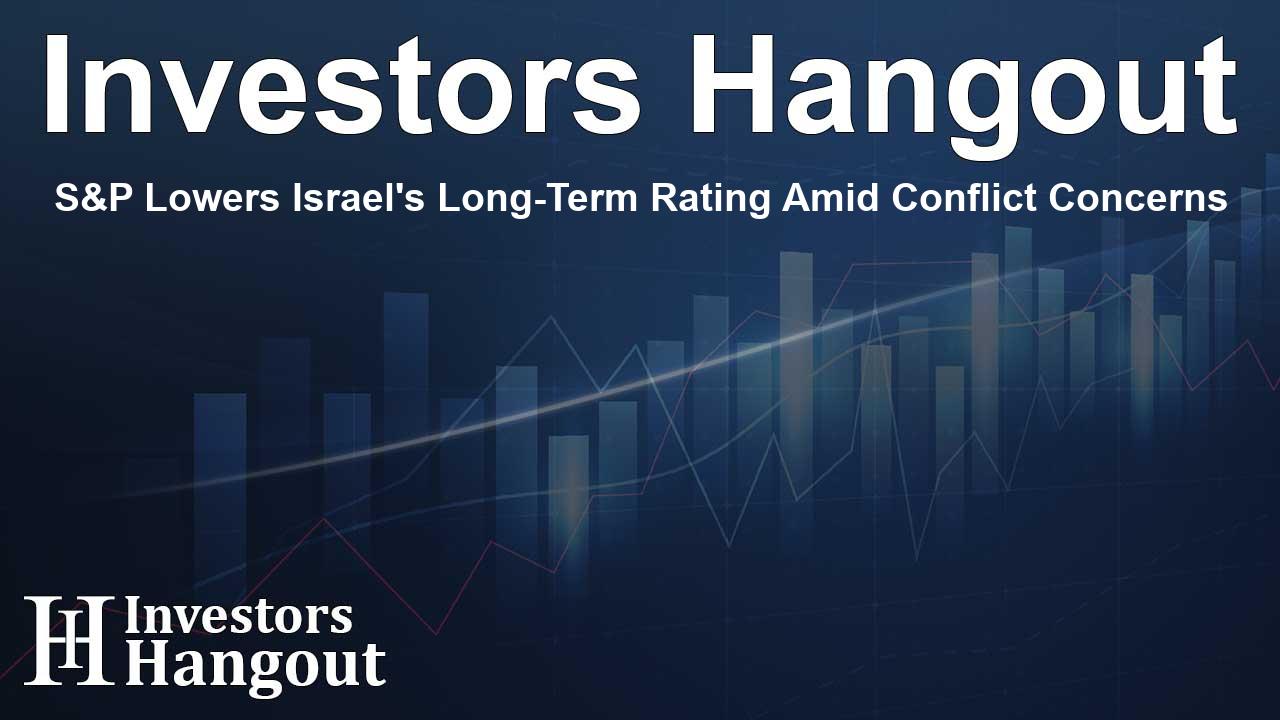S&P Lowers Israel's Long-Term Rating Amid Conflict Concerns

S&P Credit Rating Adjustment for Israel
Recently, Standard & Poor's (S&P), a prominent global credit rating agency, made a significant decision to downgrade Israel's long-term credit rating from 'A+' to 'A'. This adjustment reflects growing concerns about the country's security situation, particularly in light of the escalating conflict with Hezbollah.
The Factors Behind the Downgrade
The downgrade indicates that S&P is increasingly worried about the heightened risks Israel faces in its geopolitical landscape. Ongoing tensions and military skirmishes have raised questions regarding the stability of the region, thus influencing the rating agency's perspective on Israel's economic prospects.
Impacts on Israel's Economic Outlook
Israel's credit rating is crucial as it affects the country's borrowing costs on international markets. A lower rating often leads to higher interest rates for sovereign bonds, which can strain government finances and limit ability to fund various public services or infrastructure projects. This rating change could potentially impact investor confidence, leading to a cautious approach towards Israeli investments.
Historical Context of Israel's Ratings
Israel has enjoyed relatively high credit ratings due to its resilient economy and strong institutional framework. However, the recent downgrade suggests that external factors, primarily security risks, are becoming more influential. It's essential for investors and policymakers to understand these dynamics as they navigate Israel's economic landscape.
Looking Ahead: Strategies for Israel
In response to these challenges, Israel's government may need to adopt a multi-faceted approach to enhance security and stabilize the economic situation. This could include diplomatic efforts to de-escalate tensions, as well as reinforcing its defense capabilities to ensure long-term stability.
The Role of International Relations
Israeli foreign policy plays a critical role in its credit ratings. Improved relations with surrounding nations and international allies may bolster economic ties and enhance security, thus positively influencing future ratings. Strengthening partnerships with key players can also attract foreign investments.
Frequently Asked Questions
What does S&P's downgrade mean for Israel?
The downgrade to 'A' indicates increased concerns about Israel's security risks, which may affect its borrowing costs and investor confidence.
How will this impact Israel’s economy?
An 'A' rating could lead to higher interest rates on debt, potentially straining government finances and impacting public services.
Has Israel's rating been downgraded before?
Yes, credit ratings are reviewed periodically, and changes reflect shifts in economic and geopolitical conditions. Israel has experienced rating changes in the past due to similar factors.
What measures can Israel take to improve its rating?
To enhance its rating, Israel could focus on improving security, fostering international relations, and maintaining a strong economic performance.
How does S&P determine its ratings?
S&P evaluates various factors, including economic performance, political stability, and external risks when assigning credit ratings.
About Investors Hangout
Investors Hangout is a leading online stock forum for financial discussion and learning, offering a wide range of free tools and resources. It draws in traders of all levels, who exchange market knowledge, investigate trading tactics, and keep an eye on industry developments in real time. Featuring financial articles, stock message boards, quotes, charts, company profiles, and live news updates. Through cooperative learning and a wealth of informational resources, it helps users from novices creating their first portfolios to experts honing their techniques. Join Investors Hangout today: https://investorshangout.com/
Disclaimer: The content of this article is solely for general informational purposes only; it does not represent legal, financial, or investment advice. Investors Hangout does not offer financial advice; the author is not a licensed financial advisor. Consult a qualified advisor before making any financial or investment decisions based on this article. The author's interpretation of publicly available data shapes the opinions presented here; as a result, they should not be taken as advice to purchase, sell, or hold any securities mentioned or any other investments. The author does not guarantee the accuracy, completeness, or timeliness of any material, providing it "as is." Information and market conditions may change; past performance is not indicative of future outcomes. If any of the material offered here is inaccurate, please contact us for corrections.